

Everyone experiences stress from time to time, but it is important for us to understand what causes stress and learning to how to make stress your friend!
Students Speak: Stress. Test your Stress Knowledge. Stress - Why It Happens and Common Causes. We all deal with stress at some point in our lives.

Maybe it’s your job, a family illness, or money troubles. These are common triggers. According to a recent study, about half of all Americans say they’re dealing with moderate stress. But not all stress is bad. It can make you more aware of things around you and keep you more focused. What Is Stress? Firstly, let’s debunk one myth: stress is not necessarily a ‘bad’ thing.
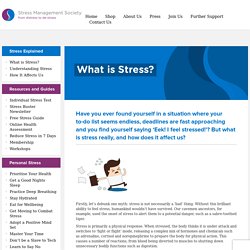
Without this brilliant ability to feel stress, humankind wouldn’t have survived. Our cavemen ancestors, for example, used the onset of stress to alert them to a potential danger, such as a sabre-toothed tiger. Stress is primarily a physical response. When stressed, the body thinks it is under attack and switches to ‘fight or flight’ mode, releasing a complex mix of hormones and chemicals such as adrenaline, cortisol and norepinephrine to prepare the body for physical action. This causes a number of reactions, from blood being diverted to muscles to shutting down unnecessary bodily functions such as digestion.
Through the release of hormones such as adrenaline, cortisol and norepinephrine, the caveman gained a rush of energy, which prepared him to either fight the tiger or run away. Student Stress & Anxiety Guide. Feelings of stress and anxiety are a part of life.
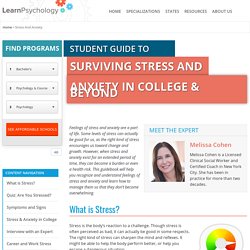
Some levels of stress can actually be good for us, as the right kind of stress encourages us toward change and growth. However, when stress and anxiety exist for an extended period of time, they can become a burden or even a health risk. This guidebook will help you recognize and understand feelings of stress and anxiety and learn how to manage them so that they don’t become overwhelming. Meet the Expert Melissa Cohen Melissa Cohen is a Licensed Clinical Social Worker and Certified Coach in New York City. Common Stressors for Students. 11 Common Causes of School Stress For Students. We already know many students—from elementary school to high school—experience stress at school.

The question parents should be asking themselves is “why?”. Common Causes of Stress Among Students. Stress is the body’s natural response to challenges.
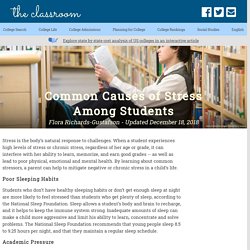
When a student experiences high levels of stress or chronic stress, regardless of her age or grade, it can interfere with her ability to learn, memorize, and earn good grades -- as well as lead to poor physical, emotional and mental health. By learning about common stressors, a parent can help to mitigate negative or chronic stress in a child’s life. Poor Sleeping Habits Students who don’t have healthy sleeping habits or don’t get enough sleep at night are more likely to feel stressed than students who get plenty of sleep, according to the National Sleep Foundation. Sleep allows a student’s body and brain to recharge, and it helps to keep the immune system strong. Academic Pressure. 5 Causes of Stress in College Students. Stress is a normal part of college life.
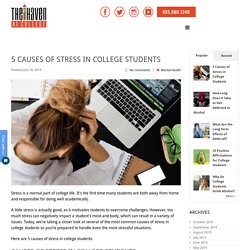
It’s the first time many students are both away from home and responsible for doing well academically. 5 Main Causes of Stress For College Students When we think of college life, we think of the greatest years of our lives.
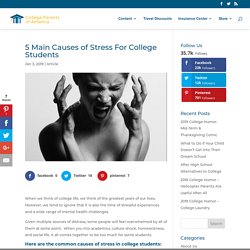
However, we tend to ignore that it is also the time of stressful experiences and a wide range of mental health challenges. Given multiple sources of distress, some people will feel overwhelmed by all of them at some point. When you mix academics, culture shock, homesickness, and social life, it all comes together to be too much for some students. Here are the common causes of stress in college students: Unhealthy Competition We all love a healthy competition but what happens when we cross the line to unhealthy? One overlooked impact facing students is choosing a major or career path early on their college life. Parental Expectation and Style There are parents who pressure their children to opt for their own preferences without taking into consideration their kids interest and aptitude.
Homesickness. Stressed students. 1 in 5 College Students So Stressed They Consider Suicide. MONDAY, Sept. 10, 2018 (HealthDay News) -- College can be so stressful that many students think about killing themselves, and some even try, a new study suggests.

Among more than 67,000 students surveyed, over 20 percent said they experienced stressful events in the last year that were strongly associated with mental health problems, including harming themselves and suicidal thoughts or attempts, researchers found. "What's striking about our findings is that there is a disproportionate number of students who are reporting a large number of exposures to stress they believe is traumatic or difficult to overcome," said lead researcher Cindy Liu. She directs the developmental risk and cultural disparities program at Brigham and Women's Hospital in Boston. "There are some stresses that are exceeding the capacity of students to cope," she added. Liu's team found that 3 out of 4 students had experienced at least one stressful event in the previous year. More information The U.S. Mental and Emotional Impact of Stress. Researchers in the field of psychoneuroimmunology (PNI) study the ways in which the immune system and the nervous system communicate with each other and impact people's mental and emotional health.
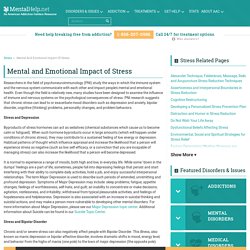
Even though the field is relatively new, many studies have been designed to examine the influence of immune and nervous systems on the psychological consequences of stress. PNI research suggests that chronic stress can lead to or exacerbate mood disorders such as depression and anxiety, bipolar disorder, cognitive (thinking) problems, personality changes, and problem behaviors. The Effects of Stress on Your Body.
You’re sitting in traffic, late for an important meeting, watching the minutes tick away.
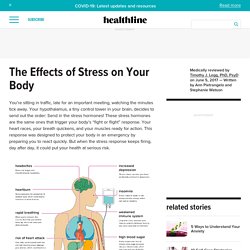
Your hypothalamus, a tiny control tower in your brain, decides to send out the order: Send in the stress hormones! These stress hormones are the same ones that trigger your body’s “fight or flight” response. Your heart races, your breath quickens, and your muscles ready for action. This response was designed to protect your body in an emergency by preparing you to react quickly. 3 Ways Stress Negatively Affects Student Performance. Today's students may be more stressed than ever before. In fact, the 2015 American College Health Association National College Health Assessment found that 85.6 percent of students had felt overwhelmed in the past year.1 The pressures of getting top grades, balancing extracurricular activities with studying, and spending time with family all add up.
In addition, students manage another identity in the digital world. Social media platforms are one more thing to keep up with and are often rife with stress-inducing comparisons, gossip and bullying. Significant life changes-such as a death in a family, moving to an unfamiliar location or a divorce-are likely to cause high spikes in stress. A 2016 study published in the International Journal of Clinical and Health Psychology shows daily stressors play just as significant a role in affecting overall mental health.2.
Stress Management Strategies: Ways to Unwind. Top 10 Stress Management Techniques for Students. Stress Management: Breathing Exercises for Relaxation. What to Stop Doing If You're Stressed. Relationships can be fantastic sources of stress relief. When we experience times of stress, the emotional support, the helpful resources, and the stability that friends bring us can be quite a buffer against the challenges we face.7 Additionally, many people find themselves looking to relationships the most when under stress. This response, like the more commonly discussed fight-or-flight response, can help us to get our needs met when we are experiencing stress.
This response drives us to connect with others and share support. That said, the stress of a conflicted relationship can take a heavy toll on your health and well-being.8 Relationships that are sometimes supportive and sometimes unpredictably conflict-riddled can be particularly difficult because there's an underlying sense of uncertainty and tension. 5 Time Management Tips to Calm College Student Stress - Campus Calm. By: Maria Pascucci, Founder of Campus Calm As your semester kicks into high gear and your schedule fills up, you college students may find your stress levels rising. You’re probably counting the days until your next vacation when time is – once again – on your side. But did you ever stop to realize that the old “time is on your side” cliche holds true 24/7, whether you’re in college student stress hell or living it up on summer break? Prioritise Your Health Archives - The Stress Management Society.
How to Reduce Stress Through Positive Thinking: 5 Methods. There is an epidemic of stress, depression, and anxiety. Despite the fact that people are talking more openly about their mental health, removing stigma does not seem to have affected the actual levels of stress being experienced. Your newsfeed and the news itself are filled with articles telling you to just be positive. The thing about positive thinking is that you can't pretend a bad situation away just by having warm and fuzzy thoughts.
Positive thinking was first made famous by writer Norman Vincent Peale in his book The Power of Positive Thinking where he wrote: “I certainly do not ignore or minimize the hardships and tragedies of the world, but neither do I allow them to dominate.” 10 Best Foods to Fight Off Stress.